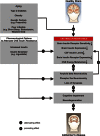Intranasal insulin as a treatment for Alzheimer's disease: a review of basic research and clinical evidence
- PMID: 23719722
- PMCID: PMC3709085
- DOI: 10.1007/s40263-013-0076-8
Intranasal insulin as a treatment for Alzheimer's disease: a review of basic research and clinical evidence
Abstract
Research in animals and humans has associated Alzheimer's disease (AD) with decreased cerebrospinal fluid levels of insulin in combination with decreased insulin sensitivity (insulin resistance) in the brain. This phenomenon is accompanied by attenuated receptor expression of insulin and insulin-like growth factor, enhanced serine phosphorylation of insulin receptor substrate-1, and impaired transport of insulin across the blood-brain barrier. Moreover, clinical trials have demonstrated that intranasal insulin improves both memory performance and metabolic integrity of the brain in patients suffering from AD or its prodrome, mild cognitive impairment. These results, in conjunction with the finding that insulin mitigates hippocampal synapse vulnerability to beta amyloid, a peptide thought to be causative in the development of AD, provide a strong rationale for hypothesizing that pharmacological strategies bolstering brain insulin signaling, such as intranasal administration of insulin, could have significant potential in the treatment and prevention of AD. With this view in mind, the review at hand will present molecular mechanisms potentially underlying the memory-enhancing and neuroprotective effects of intranasal insulin. Then, we will discuss the results of intranasal insulin studies that have demonstrated that enhancing brain insulin signaling improves memory and learning processes in both cognitively healthy and impaired humans. Finally, we will provide an overview of neuroimaging studies indicating that disturbances in insulin metabolism--such as insulin resistance in obesity, type 2 diabetes and AD--and altered brain responses to insulin are linked to decreased cerebral volume and especially to hippocampal atrophy.
Figures
References
-
- Sperling RA, Aisen PS, Beckett LA, Bennett DA, Craft S, Fagan AM, et al. Toward defining the preclinical stages of Alzheimer’s disease: recommendations from the National Institute on Aging-Alzheimer’s Association workgroups on diagnostic guidelines for Alzheimer’s disease. Alzheimers Dement. 2011;7(3):280–292. doi: 10.1016/j.jalz.2011.03.003. - DOI - PMC - PubMed
-
- Alzheimer’s Association. Alzheimer’s disease facts and figures. 2012; http://www.alz.org. - PubMed
-
- 2012 Alzheimer’s disease facts and figures. Alzheimers Dement. 2012;8(2):131–68. doi:10.1016/j.jalz.2012.02.001. http://www.ncbi.nlm.nih.gov/pubmed/22404854 - PubMed
Publication types
MeSH terms
Substances
Grants and funding
LinkOut - more resources
Full Text Sources
Other Literature Sources
Medical


